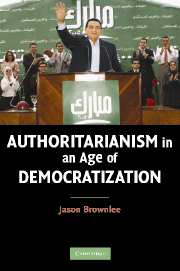Book contents
- Frontmatter
- Contents
- List of Figures and Tables
- Abbreviations and Acronyms
- Acknowledgments
- Introduction: Authoritarianism in an Age of Democratization
- 1 The Political Origins of Durable Authoritarianism
- 2 The Inception of Ruling Parties
- 3 Institutional Legacies and Coalitional Tensions
- 4 Ruling Parties and Regime Persistence
- 5 Elite Defections and Electoral Defeat
- 6 Confrontation and Democratization
- 7 Conclusions
- References
- Index
5 - Elite Defections and Electoral Defeat
Iran during the Third Wave
Published online by Cambridge University Press: 05 June 2012
- Frontmatter
- Contents
- List of Figures and Tables
- Abbreviations and Acronyms
- Acknowledgments
- Introduction: Authoritarianism in an Age of Democratization
- 1 The Political Origins of Durable Authoritarianism
- 2 The Inception of Ruling Parties
- 3 Institutional Legacies and Coalitional Tensions
- 4 Ruling Parties and Regime Persistence
- 5 Elite Defections and Electoral Defeat
- 6 Confrontation and Democratization
- 7 Conclusions
- References
- Index
Summary
The previous chapter showed the impact of parties by examining how they affected elite behaviors: When disgruntled leaders seemed to be heading toward forming a separate public faction, the ruling party provided political influence, drawing dissidents back into the coalition by guaranteeing a role in national agenda setting. Historical analysis of elite cohesion and electoral control in Egypt and Malaysia thus provides one set of evidence that ruling parties account for the two countries' shared experience with durable authoritarianism. Reinforcing this account with cases of contrast, the present and following chapter examine the record of nonparty regimes and unbounded tactical alliances in Iran and the Philippines.
Such partnerships can be potent vehicles for gaining power and eliminating common foes. They prove ineffective, however, for consolidating power and managing the conflicting interests of newly dominant leaders. Where elites lack reliable mechanisms for protecting their long-term influence, intraregime debates escalate, and distrust mushrooms. Catalyzed by the top leader's earlier abandonment of political parties, personal insecurity spreads in the ruling class. As erstwhile insiders find themselves adrift, they may seek new partners among the marginalized, moderate opposition. Thus, by eschewing any lasting institutional bonds between elites, leaders bent on monopolizing power may instead squander it, alienating the opportunists with whom they previously colluded. Conversely, these estranged elites buoy long-time activists and enable them to make new breakthroughs.
During the 1990s, Iran lacked the institutional structure that protected rulers in Egypt and Malaysia from their opponents.
- Type
- Chapter
- Information
- Authoritarianism in an Age of Democratization , pp. 157 - 181Publisher: Cambridge University PressPrint publication year: 2007



